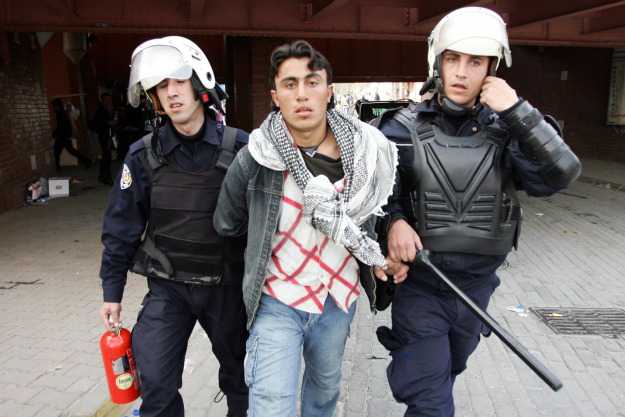This week in the eastern Turkish city of Diyarbakir, 151 Kurdish activists, including 12 mayors of local towns, were put on trial for ties to the militant Kurdish Workers’ Party (PKK). In addition to the crime of belonging to the group, the activists are also accused of holding illegal demonstrations and distributing anti-government propaganda. According to reports, a special courtroom had to be built in Diyarbakir because of the number of defendants.

But trials of this size are hardly unprecedented in Turkey. Indeed, they’re becoming the norm. Eighty-six alleged PKK members were arrested in a nationwide crackdown this February. One-hundred-twenty suspected al Qaeda members were arrested in January. More than 100 people were arrested in connection with an alleged coup plot in January 2009. And Eighty-six were arrested for ties to the rumored “Ergenekon” coup conspiracy in 2008. In a less politically fraught move, 46 people were arrested following an investigation into soccer match-fixing this year. Why does Turkey always arrest so many people at once?
It’s probably not because Turkey has more massive criminal conspiracies per capita than anywhere else. Other countries manage to break up terrorist plots without resorting to mass arrests — it was the Buffalo Six not the Buffalo 86, for instance. More likely, Ankarauses the public spectacle of mass arrests to send a message. Under Turkish law, an individual can be charged for simply belonging to a banned organization, even if he or she hasn’t actually participated in any illegal activities. Because groups like the PKK don’t exactly keep membership rolls, Turkish authorities have pretty wide leeway to crack down on anyone they deem to be subversive. Many of those arrested in this week’s roundup may not actually be PKK members, but by lumping them in with the actual militants, the government could be sending a signal that it won’t tolerate overt Kurdish nationalism.
In the case of the shadowy ultranationalist organization Ergenekon, many doubt that it actually exists at all and believe the Turkish government is using it as a pretext to attack hard-line secularists in the military.
Despite its mass arrests, Turkey has a relatively low conviction rate — around 50 percent. Out of the original 86 Ergenekon arrests, only 48 are still on trial. But because Turkish law allows suspects to be held in prison during their trial, the arrest and trial itself can often be punishment enough — and a powerful deterrent for those who might think of instigating their own plots.
It’s not clear whether the mass-arrest strategy is working to quiet unrest — in the Kurdish case, discontent seems to be growing. But it’s certainly a logistical nightmare. In addition to the special courtrooms and prisons that have had to be built for Turkey’s conspiracy trials, the paperwork alone can be crippling. The Ergenekon indictment was 2,455 pages long and took more than 280 hours to read aloud in court.
Thanks to Gareth Jenkins, Istanbul-based journalist and senior fellow at the Silk Road Studies Program.
via FP Explainer: Why Does Turkey Always Arrest So Many People at the Same Time? – By Joshua E. Keating | Foreign Policy.

